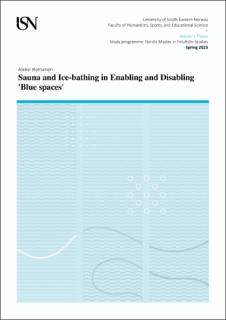| dc.description.abstract | This study contributes to a body of research on health-enhancing 'blue spaces' by elaborating on the optimal conditions for promoting physical activity at the coast, what makes 'blue spaces' attractive for spending leisure time in general, and how negative experiences might affect positive well-being outcomes. The relationship between 'blue spaces' and well-being will be studied in the context of wintertime sauna and ice- bathing in Oslo, the capital city of Norway. The study applied grounded theory methodology together with the extended therapeutic landscape concept and the interdisciplinary model of therapeutic landscape experiences at the coast to answer the research questions: 1. How and why individuals’ well-being is enabled and disabled through engaging in wintertime sauna and ice-bathing in various 'blue spaces'? 2. How do the enabling and disabling aspects of the therapeutic experiences relate to each other? A mixed qualitative approach was conducted, combining ethnographic field observations and individual interviews. The data consisted of six individual interviews with five participants, with various experiences of sauna and ice-bathing during wintertime in Oslo, and one facilitator of a sauna and ice-bathing facility in central Oslo. In addition, seven ethnographic participant observations in urban sauna facilities in central Oslo were conducted over a period of two months between January and March 2023. The results indicated that participants' well-being was enabled and disabled through social, achieving, immersive and symbolic experiences. The results further indicated that enablement and disablement could occur simultaneously and were highly dependent on contextual factors. The results support a relational understanding of 'blue health' promotion, in which health enablement and disablement arise from the relationship between a specific person, place, and context. Understanding the relationship of well-being and 'blue spaces' as a dialectical relationship of enablement and disablement experienced through social, achieving, immersive and symbolic dimensions can highlight the contextual factors necessary to consider, when aiming to provide effective and equitable health policies and interventions in relation to 'blue spaces. This includes the understanding of the specific benefits and limitations for marginalized groups in various 'blue spaces'. | |
